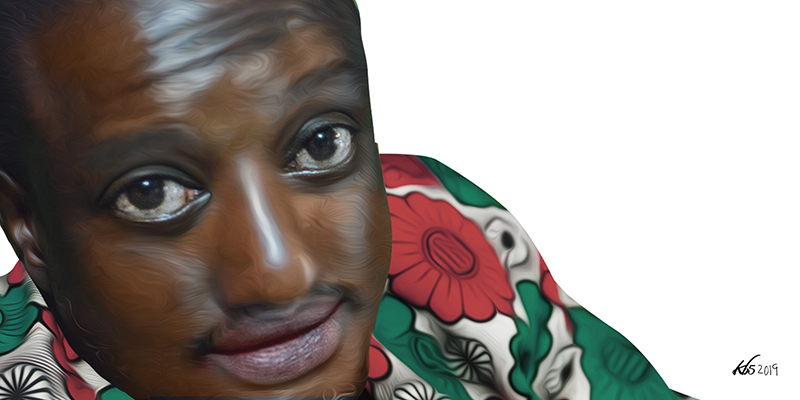“Some birds should never be caged, their feathers are too bright. But when one such is finally set free, something inside of you sings that knows it was wrong to cage it in the first place.” – Red in Shawshank Redemption
I first met Binyavanga Wainana in 2002 – an election year in Kenya when a hopeful country was looking forward to removing an authoritarian regime and ushering in a brave new world. He had just returned from South Africa and was scouting around for ideas for a literary journal that he hoped to establish to revive the dying (if not dead) literary scene in Kenya.
It was during these heady days—when it seemed that anything was possible – that Binya, as he was fondly called, came back home like a gust of fresh air that sweeps through a damp, mouldy room and changes the atmosphere. His enthusiasm was infectious. He could mesmerise an audience so much so that many aspiring writers, including myself, who never imagined having a literary career, began writing their own stories, in their own voices, with no apologies.
With the launch of his brainchild, the literary journal Kwani?, in 2003, he unveiled talented and previously closeted writers who had been silenced not just by a government afraid of creatives, but by a stodgy old school literary fraternity that saw no value or merit in the writings of those they deemed to be too unschooled or undisciplined. As the blogger and academic Wandia Njoya stated in a tweet shortly after his death, Binyavanga “liberated our art from the literature police in Kenyan universities”.
Indeed, Binyavanga democratised the literary space in Kenya, especially for young writers. He entered the Kenyan literary scene at precisely the time when the country was undergoing a major transition – a “second liberation” brought about by a group of anti-establishment politicians and activists and a population hungry for change, which led to the election of Mwai Kibaki and an end to Daniel arap Moi’s 24-year reign.
With the launch of his brainchild, the literary journal Kwani?, in 2003, he unveiled talented and previously closeted writers who had been silenced not just by a government afraid of creatives, but by a stodgy old school literary fraternity that saw no value or merit in the writings of those they deemed to be too unschooled or undisciplined
It is difficult to write about someone you have known, especially someone who was as charismatic and controversial as Binya, whose short life as a literary icon generated as much admiration as it did indignation. He was not without flaws. Loud, sharp, witty, and even rude at times, he dared to question the status quo that reduced Kenyans, and Africans in general, to mere spectators in their own lives – people who saw themselves through other (mainly white) people’s eyes. Binya opened up literary spaces that had remained closed for many Kenyan writers. He gave us permission to write. This, I believe, was his greatest gift to young Kenyan writers, many of whom ventured out on their own and became literary warriors in their own right.
A polarising influence
Binyavanga will be remembered for many things, among them his seminal satirical essay, “How to Write about Africa”, in which he lampooned Western journalists and so-called Africa experts for their negative, stereotypical and ignorant depictions of the continent (starving Africans, naked dead bodies, celebrity activists and aid workers trying to save the continent etc.). This essay not only made many Western journalists cringe, but was also a call to African writers to write about their lives and their continent in an authentic voice without worrying too much about how they would be perceived by non-African readers. In his essays, writings and speeches, he represented a new generation of Kenyan writers who, as Nigerian novelist Helon Habila commented, attempt to explain Kenya and Africa but do so “without a knee-jerk resort to colonial woes”.
Wandia Njoya stated in a tweet shortly after his death, Binyavanga “liberated our art from the literature police in Kenyan universities
But the very Westerners that Binya criticised in his writings were quick to adopt him and give him a platform where he could thrive. In a sense, they co-opted him, made him one of their own, thereby taking some of the sting out of his critique. Although often vilified – or perhaps misunderstood – at home, Binya was lauded abroad for his genius and writing acumen. He won the Caine Prize for African Writing in 2002, which catapulted his career as a writer and earned him a directorship at the Chinua Achebe Centre at Bard College in the United States. Thereafter, he was wined and dined by publishers, agents and philanthropists eager for a fresh new African voice.
The Nigerian blogger and columnist Ikhide R. Ikheloa, in an essay titled “Our World According to Binyavanga Wainaina”, called Binya “a brilliant lunatic” who writes about darkness with “startling clarity and casualness”. However, Ikheloa also censured the Kenyan writer for being one among many African writers who are rescued by the West “like abused puppies”. He was particularly harsh when commenting on the author’s memoir, One Day I Will Write about This Place:
“Wainaina’s book brings to full convergence the anxieties and tensions around the tortured relationship between the West and African writers. On the one hand, Wainaina acknowledges openly and graciously in that book that it was published thanks to generous funding from a long list of Western donors and corporations…On the other hand, Wainaina is almost contemptuous of the interventions of the West in his fortunes; sometimes he gives the impression that he suffers from a culture on entitlement. Indeed if I was to offer any criticism of this lush narrative it is that Wainaina’s analysis conveniently excluded the role of the African writer in fomenting (for profit) the stereotyping of Africa in the enthusiastic hawking of the single story.”
The Economist, in a review of the book, was equally scathing: “Too many African writers are co-opted by the American creative-writing scene only to be reduced by prevailing navel-gazing. Separately, much of the African writing culture that remains on the continent, including Kwani?, is propped up with cash from the Western donors that African writers purport to excoriate.”
However, both Ikheloa and the Economist failed to acknowledge that for any African writer to be taken seriously, he has to first go through an assembly line of agents, editors, publishers and distributors based in Europe or North America. African governments rarely support the arts, writers in particular, and the publishers on the continent are more interested in publishing textbooks (that bring in more profits) than publishing an author who is little known outside his country.
Binyavanga will be remembered for many things, among them his seminal satirical essay, “How to Write about Africa”, in which he lampooned Western journalists and so-called Africa experts for their negative, stereotypical and ignorant depictions of the continent (starving Africans, naked dead bodies, celebrity activists and aid workers trying to save the continent etc.).
In 2007, perhaps in reaction to these criticisms, Binyavanga rejected an invitation by the World Economic Forum (WEF)’s nominating committee to be named as one among 250 Young Global Leaders. In an email to the chair of the committee, Queen Rania of Jordan, he wrote:
“I assume that most, like me, are tempted to go [to China where the WEF was being held] anyway because we will get to be ‘validated’ and glow with the kind of self-congratulation that can only be bestowed by very globally visible and significant people…The problem here is that I am a writer. And although, like many, I go to sleep at night fantasizing about fame, fortune and credibility, the thing that is most valuable in my trade is to try, all the time, to keep myself loose, independent and creative. It would be an act of great fraudulence for me to accept the trite idea that I am ‘going to significantly impact world affairs’.”
Coming out
However, Binyavanga would go on have a significant impact on the LGBTQ community in the last few years of his life when he stoked (some might even say welcomed) controversy, particularly after he came out as a gay man in 2014 and published what he called his book’s “lost chapter”. The coming-out essay, “I am a Homosexual, Mum”, enraged the conservative Christian evangelical moral police (who he loathed and who he blamed for turning many Kenyans into zombie religious fanatics), who dismissed the author as the devil’s work. But the gay community both at home and abroad congratulated him for coming out, especially at a time when many African countries were targeting and criminalising homosexuals.
But not everyone was convinced that this Kenyan writer had the intellectual mettle to liberate Kenyan minds. In a critique of his six-part self-made video, “We Must Free Our Imaginations” (or what Binya referred to as “What I Have to Say About Being Gay”) published in the Saturday Nation, the Kenyan social scientist and academic, Joyce Nyairo, described his arguments as “scattered, off-hand generalities” and accused him of having a limited understanding of Kenya’s history. “His knowledge of homosexuality in colonial and post-colonial Kenya is either non-existent or it has been unwisely excluded,” she wrote.
Many also accused him of being deliberately apolitical or politically naïve. His quest to show Kenyan urban middle class lives (like his own family’s in Nakuru) as normal – without sufficiently explaining the abnormality that produced this class – earned him a few barbs. However, when the circumstances demanded, Binya could take on the role of political activist. In January 2008, for instance, at the height of the post-election violence in Kenya, when churches were being torched and women were being gang-raped for being “the wrong tribe”, he mobilised a group of writers to explain to the world what was going on in the country. He believed then that through the power of the pen, Kenya could be prevented from descending into a Rwanda-like genocide.
The Nigerian blogger and columnist Ikhide R. Ikheloa, in an essay titled “Our World According to Binyavanga Wainaina”, called Binya “a brilliant lunatic” who writes about darkness with “startling clarity and casualness”
But while campaigning for a peaceful Kenya, he aligned himself with the very forces that had catapulted the country to the brink of a dangerous precipice. In 2013, when Uhuru Kenyatta and William Ruto were declared the winners of the presidential election, Binyavanga viewed their victory as a victory against the imperialist West and its so-called lackey, the International Criminal Court, which had indicted the duo for crimes against humanity committed after the 2007 election. “Gone are the days when a bunch of European ambassadors speak in confident voices to the Kenyan public about what we should do, why we should do it,” he wrote in the Guardian newspaper. “The west should expect more defiance from an Uhuru government – and more muscular engagement.”

Though he admitted later that he had perhaps declared victory too soon, he failed to understand that the problem afflicting Kenya was not that Western governments were imposing their will on the Kenyan people, but that Kenya was sliding back to the bad old days of the Moi era, when dissent was not tolerated and when a culture of mediocrity and corruption pervaded all arms of government.
In a letter published in Brittle Paper in October 2017, when Kenya was about to go through another election, he stated: “I would like to apologise to all the people of Kenya for not seeing through the attempts to rig the election in 2013. I believe that going to the polls on 26 October with the same IEBC [Independent Electoral and Boundaries Commission] is a mistake.” Like many others who view Kenya’s democracy purely through the lens of free and fair elections, he failed to see that the main problem in Kenya is not that we consistently have rigged elections; the problem is more systemic – we refuse to acknowledge that the rain started beating us at independence, when the first wave of leaders decided that the spoils of a post-colonial state should be distributed among a tiny elite and that ethnic identity should determine the nature and scale of that distribution.
The change that never came
“I want to live a life of free imagination,” Binya stated. “I want to see this continent change.”
Sadly, the change that he envisioned in Kenya did not come during his lifetime. By the time he died last week, at the age of 48, the same reactionary, anti-change forces were back in power – forces that are taking Kenya back to those dark days when creative minds and imaginations were considered a threat to national security (or rather, to the security of the president) and when artistic spirits were crushed. We no longer have the torture chambers that sent writers like Ngugi wa Thiong’o into exile four decades ago, but Binya’s untimely death has reminded us that the struggle for a new way of thinking and bold ideas is still not over; on the contrary, the old guard is firmly back in the saddle.
However, there is no doubt that Binyavanga Wainaina forever changed the literary landscape in Kenya, opening it up to a new generation of Kenyans who are no longer afraid to experiment or innovate. He never managed to finish the novel he said he was writing when he fell ill a few years ago, but he did leave behind an indelible body of work that challenged his generation to take charge of their own narratives.
I think Binya would have agreed with the Italian writer, Oriana Fallaci, who said, “To write is to die a little less when I die, to leave the children I did not have, to make people think a little more.”








